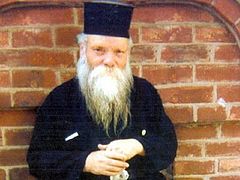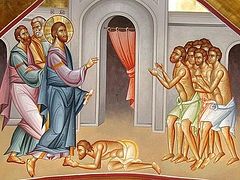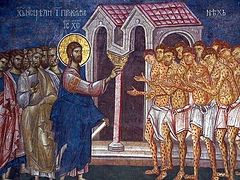Elder Eumenios (Saridakis † 1999) was an amazing ascetic, a saint of our times who diligently took care to conceal his holiness. Metropolitan Neophytos of Morphou knew this man of God well: Living in Athens, he was the elder’s spiritual child. Vladyka Neophytos shared his memories of the elder in an interview with the newspaper “Orthodox Truth” (“Ορθόδοξη Αλήθεια”).
—Master, bless! First, we would like to ask when you got acquainted with Elder Eumenios?
—In 1981. I remember it quite well. The lepers in Limodon1 used to joke: “Fr. Eumenios, you’ve joined the ‘The Tens’ Club.’2 The lepers’ humor made an impression on me. Andreas Papandreou3 came to power the first time that year. He was fifty. He was also born in 1931.
—And how did you meet the elder?
—Blessed Gerasimos (Phocas), the former Metropolitan of Kefalonia, introduced me to Geronda. It happened on the Wednesday of the Great Canon. I was seeking a spiritual father and he recommended Fr. Eumenios to me, speaking very positively of him. However, it wasn’t known whether he heard confessions. Little was known about him at that time, even as a spiritual father.
When I said I wanted to confess, the elder replied that he doesn’t confess the healthy, only the leprous. “Are you saying that so I would wish I had leprosy?” I asked him. He laughed and said there are spiritual fathers in the Ilisia region, where I lived—I should go to them.
I started to leave upset, but as soon as I got close to the door, he called out to me. The elder later said that he saw me in a riassa [the future metropolitan was only a layman then.—Ed.] and heard the voice of the Holy Spirit saying: “Hold onto this child. He will become a priest! And from now on, confess everyone!” Thus, my arrival had quite a positive result: The elder’s door was opened to everyone. He was a confessor, but for several years he had confessed only the sick.
—How would you describe him as a spiritual father? Was he stricter than your elder—St. Iakovos?
—Yes, I would say he was stricter. He would become stricter when he understood that the one confessing had a desire to take what was happening seriously and not just to get the prayer of absolution and commune. That is, when a spiritual adoption happened, he became stricter. I liked it. My soul needed this healing rigor. But this is my personal feeling. Someone else could say he was the most forgiving person.
—I myself was able to meet the elder several times and felt some kind of magnetism that draws one to him, although he “said” little…
—It was the sweetness of the Holy Spirit, Who dwelt in him because of his asceticism. And this grace was poured out upon all who drew near to him. People felt it. Even sinners felt it. Everyone felt that this man had something, and this “something” was a gift of the Holy Spirit.
You know, yesterday, while studying St. Isaac the Syrian, I recalled the words said to me by another saint—Elder Paisios: “Never keep this book closed on the table. Let it always be open and never closed.” Then I thought: Were someone to ask me if I know anyone who has experienced everything that St. Isaac the Syrian describes with such details and depth, I would answer: Elder Eumenios.
Geronda himself told me how he experienced everything that St. Isaac describes and thought it was all spiritual delusion, especially after the death of his elder, St. Nicephoros the Leper, when he was left alone in the years after 1964. He told me that when the ascetical works of St. Isaac the Syrian were issued by the Apostle Barnabas Publishing House at some point in 1970, he read them and realized that what he had experienced was not delusion, but from God. This revelation kept him awake for three days.
For example, he had continuous tears, as St. Isaac describes. He lived it. He wept ceaselessly for his sins, mistakes, and passions for two and a half years. The tears were searing, as the elder told me, and couldn’t last more than two or two and a half years. Otherwise, a person would get sick. The tears are uncontrollable; you can’t control them. “At Liturgy,” the elder told me, “or just when I was speaking with people, hot tears would flow from my eyes and burn me.” And I realized that the word “feeling” doesn’t have just a spiritual meaning. Later, he said, the tears became controlled and non-burning. That is, the elder experienced sanctity in all its succession.
—Did he ever tell you about St. Nicephoros?
—Yes, of course. Many times.
—Which memories of Elder Eumenios are most dear to you?
—Well, there are many. First of all, he was diligently non-judgmental. If, thanks to his gift of clairvoyance, he noticed that you were judging about something or, even worse, condemning someone, he began “to act.” He would just go silent, not speaking with you. But if he knew you well, then he could get angry and give you a piece of his mind. And you understood: The elder saw your sin, that you condemned someone.
He was more sensitive to judgment and condemnation than to carnal and other types of sins. You had to have a lot of patience to be his spiritual child. You had to constantly hear Geronda’s comments about this. He himself had a great capacity for non-judgment. If his cell caught fire, he would try to put out the fire. But if you said to him later: “Accursed fire! Geronda, you nearly caught fire!” he would answer: “What’s wrong with you? The fire was very beautiful!” Many don’t understand me when I say things like that. For example, it’s gotten hot on Cyprus now. If you would tell the elder: “This heat is terrible!” he would answer you: “The heat is wonderful.” And it was always clear that he spoke this way, truly believing it. He didn’t even want to condemn the weather!
Once, when it had rained for several days, I said: “Most Holy Theotokos, how much more will be poured out?!” Elder Eumenios answered: “As much will be poured out as is pleasing to the Most Holy Theotokos.” He didn’t want us to condemn anyone. They would tell him: “Papandreou said this or that,” when there were changes in the government of the country. “Well done, Papandreou,” he would respond. It was the same if you discussed other politicians, for example about Karamanlis4: “Well done, Karamanlis!” Once some zealots wanted to tell him something about the patriarch: “The patriarch is holy,” he said, interrupting them. That is, he absolutely did not allow criticism of politicians, Church affairs, and… meteorology.
His quality of not judging allowed you to realize how pure he was physically. Know that a non-judgmental person becomes chaste and circumspect. It’s difficult for the devil to tempt such people, especially in the flesh.
The elder was a very joyful person. That’s the second thing that was particularly memorable about him. Few people can be found with such joy. Many have a sense of humor, but he had rather the gift of rejoicing. I don’t think the Lord will account me worthy to see such a person again. I remember his indescribable joy at many Liturgies and services that lasted for five hours. Until the very last prayer, the smile never left the face of Fr. Eumenios.
Probably few know that a demon battled against him for some time. Recently a possessed young man related how he asked the saint to heal him and the saint answered him: “I will help you, but know why this happened to you. It befell me out of pride, but you—out of blasphemy.”
—When the demon took power over him, did Fr. Eumenios already know Elder Nicephoros?
—Yes, they knew each other. But out of humility, St. Nicephoros did nothing. He sent Elder Eumenios to his hometown—to the island of Crete, and he was exorcised by two great saints, who are not officially glorified: Elders Nikodemos the Confessor and Anastasios (Koudoumianos), his close friend. They are great Cretan saints. When the fame of his ability to cast out demons spread, Nikodemos left the island and retired to Mt. Athos, where he lived in a skete in Kapsala, not far from Karyes.
—Is it true that other ascetics pastored the lepers at Limodon Hospital?
—Yes, they needed someone to do it. I told the elder’s hagiographer—the monk Fr. Simon—about it. I told him that no one becomes a saint on his own. Everyone is helped by his surroundings, both the positive and negative. Elder Eumenios’ environment helped him acquire holiness.
Although he himself was a man of God from birth, it helped him a lot that where he found himself, in Limodon, there was, firstly, St. Nicephoros, who followed all the ascetic rules of St. Anthimos of Chios, and secondly, St. Anthimos, the follower of the ascetic system of St. Pachomious of Chios—the elder of St. Nektarios of Aegina. What company!
There were other people in Limodon who were sanctified by prayer, patience, and obedience to Elders Eumenios and Nicephoros.
There was one woman by the name of Vangelia, from Epirus, who was blind and paralyzed from birth. I knew her very well. This blind woman saw the Theotokos. The devil would throw her from her bed onto the marble floor of her room for reading akathists. She wouldn’t call a nurse to pick her up—she didn’t want to disturb anyone. She could just lie there for two hours until a nurse would happen to walk by, and finding her on the floor, would put her back up on her bed. One time, she told me, she was so cold, but her desire not to tire the nurse was so great that the Theotokos herself picked her up and laid her on her bed.
Agripa was another sanctified woman. Fr. Evangelos (Papanikolaou) spoke about what a sweet fragrance poured out at the opening of her relics.
And let’s not forget those righteous people Arestides and Charalampos.
—Those are the two who helped Fr. Eumenios read the Psalter?
—And not only read the Psalter. Kostas was a chanter. He also suffered from leprosy but didn’t live at Limodon. He would come to sing on the kliros. Michalis, a blind man, also helped with the Psalter. We would go to church in the wee hours and begin Orthros. Then Michalis would come and we would celebrate the Holy Liturgy, which Michalis knew by heart.
And holy myrrh was gathered from the many Liturgies and prayers of Geronda and the lepers.
All his years, except the last, Elder Eumenios diligently kept himself hidden. Let me explain what “hidden” means. If he foresaw me telling someone on the bus or taxi that I was going to Elder Eumenios—to a holy man, then when I got there, his “attack” was waiting for me. It wasn’t easy to be around him. He knew what you were thinking about, what desires you had, what you were judging about, who you were condemning, who you disliked. But he could turn everything into a joke and was always laughing with his characteristic laugh.
There’s a lot more I could recall. But I told all of it to Fr. Simon, who is writing a book about the elder. The only thing he doesn’t talk about is the people around Geronda. Perhaps a second book should be written, telling about other patients. Blessed Gerasimos (Phocas) used to call Limodon the “Holy Mountain of Athens.”
The “Holy Mountain of Athens” was a place of refuge for human pain. People mercilessly tormented by this terrible disease patiently bore their crosses, led by Elder Eumenios, this spiritual fruit of St. Nicephoros, of St. Anthimos, of St. Pachomios… Fr. Eumenios supported and instilled hope in those patients whom “God found faithful.”
In a spiritless age he lived among us and supported the people of God. And today, when dark clouds of all kinds—national, moral, social, interpersonal, economic—darken the skies over our homeland and the world as a whole, these souls—souls that are pure before the Lord—can see St. Eumenios above the clouds with his elder, St. Nicephoros, and all those pious and righteous ones who were with him. Let us entreat that these dark clouds would depart from our horizon by their holy prayers before the Lord.






